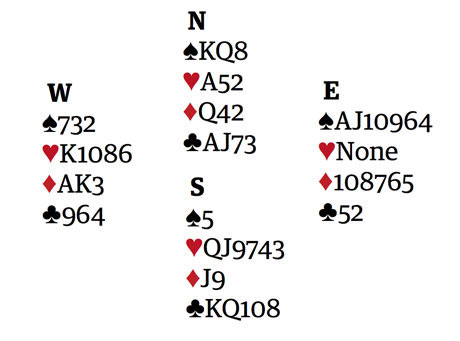Which discard system do you prefer? Several people at my local club play a system called Dodds, where any discard conveys a message about your holding in another suit, the exact meaning depending on whether the card is high or low, odd or even, red or black, or if it’s Tuesday or Thursday. I ought to make the effort to understand it, but life’s too short at my age.
Instead, I get my own back on the Dodderers by telling them that my discards are ‘KWTL’. When this results in a puzzled look, I explain that KWTL is not a country music radio station in Oklahoma, but stands for ‘keep winners throw losers’. KWTL ought to be a simple system to play, but it’s not always that easy…
In the Torquay Swiss Pairs my right hand opponent is a leading tournament player, though his partner is unknown to me. On the last hand of the match, honours are about even when I pick up
♠ 5 3 2
♥A K J 10
♦ 9 5 4
♣ A J 7
and hear partner open a reverse Benji two diamonds. I relay with two hearts and partner bids two spades to show a hand with eight playing tricks in spades. I set the suit by raising to three spades, and partner makes a cue bid of four diamonds. I am going to bid a slam so I wheel out 4NT, key card Blackwood, getting a response of five diamonds to show three key cards. I make a further enquiry with five hearts and hear six diamonds, showing the queen of trumps and the king of diamonds but no king of clubs.
I could bid six hearts now, to confirm that we have all the key cards and maybe to suggest a grand if partner holds the queen of hearts, but that would take us into uncharted waters and I am going to settle for a small slam. I can count eleven top tricks and the contract will depend on a heart finesse at worst. As it is pairs I go for the maximum and bid 6NT.
West leads the king of clubs and I see
♠ A K Q J 7 6
♥♦ A K 7
♣ 8 6 5 4
♠ 5 3 2
♥ A K J 10
♦ 9 5 4
♣ A J 7
Rats. I hadn’t thought of that. So much for taking a heart finesse for my twelfth trick. On the opening lead East plays the nine, which could be the start of a peter to show a doubleton, so it looks as if West has four or five clubs to the K Q 10. How do you rate my chances now?
If West has the expected club holding, the contract is odds-on. East is more likely to hold the queen of hearts (he has fewer clubs and more vacant places in his hand for the other suits), and in that case there will be a double squeeze as neither opponent will be able to guard diamonds in the end game. I might even be able to win the last trick with the seven of diamonds and claim a free beer, although it is the first match of the day and I do not normally start drinking at 11.30 am.
I duck the first trick to tighten the position for the squeeze. West switches to a low diamond, so I win in dummy and cash the spades. There is no need to count the opponent’s hands - I just need to keep track of whether they unguard either minor - and I don’t look too closely at their discards. I throw a heart and a diamond, but then I have to discard the jack of clubs. That shouldn’t matter, as if West holds K Q 10 he will still be in sole charge of the suit.
I come to hand with the Ace of clubs. By now East will have been squeezed out of his guard in one of the red suits. If he has unguarded diamonds, two rounds of hearts will now squeeze West in the minors.
I cash the top hearts and the queen falls from East so I claim my slam, only slightly disappointed that I did not take the last trick with the seven of diamonds. All this has taken a while, so there is no time for a post-mortem and we move on to the next match, feeling quite satisfied at having made a slam on a double squeeze.
It is only after the session when I study the hand records that the full deal is revealed as
No squeeze was needed, as after ducking the opening lead I had twelve top tricks. Or I did until I threw the jack of clubs away, an abject failure to follow KWTL. Fortunately East let me off the hook as he also violated KWTL by discarding a third heart rather than a diamond. If he had kept three hearts and three clubs I would have gone down in a cold contract.
A final point about the bidding - I only chose play in no-trumps because we were playing pairs. It occurred to me afterwards that the auction had revealed a lot about partner’s hand but almost nothing about mine, so there was a good reason for my hand to be declarer at any form of scoring. I don’t think that East would have misdefended if my hand had been on the table.

